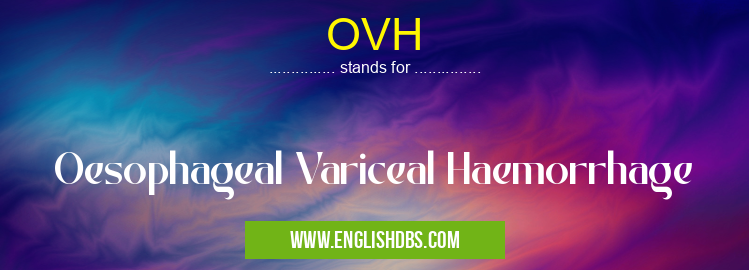What does OVH mean in UNCLASSIFIED
Oesophageal Variceal Haemorrhage (OVH) is a life-threatening condition that occurs when varices, or enlarged veins in the oesophagus, rupture and bleed. OVH is a medical emergency that requires immediate treatment to stop the bleeding and prevent further complications.

OVH meaning in Unclassified in Miscellaneous
OVH mostly used in an acronym Unclassified in Category Miscellaneous that means Oesophageal Variceal Haemorrhage
Shorthand: OVH,
Full Form: Oesophageal Variceal Haemorrhage
For more information of "Oesophageal Variceal Haemorrhage", see the section below.
What is Oesophageal Variceal Haemorrhage?
OVH occurs when the pressure in the portal vein, which carries blood from the intestines to the liver, becomes too high. This can happen due to conditions that block the flow of blood through the liver, such as:
- Cirrhosis: Scarring of the liver that obstructs blood flow
- Portal vein thrombosis: A blood clot in the portal vein
- Budd-Chiari syndrome: A blockage of the hepatic veins, which carry blood from the liver to the heart
As the pressure in the portal vein increases, blood is diverted to other veins, including the oesophageal veins. Over time, these veins become enlarged and thin-walled, forming varices. If the varices rupture, OVH can occur.
Symptoms of OVH
The most common symptom of OVH is sudden, massive vomiting of bright red blood. Other symptoms may include:
- Dizziness or fainting
- Rapid heart rate
- Low blood pressure
- Confusion
- Jaundice (yellowing of the skin and eyes)
Diagnosis of OVH
OVH is diagnosed based on the patient's symptoms and a physical examination. A doctor may also order one or more of the following tests:
- Oesophagoscopy: A procedure that uses a thin, flexible tube with a camera to examine the oesophagus
- Endoscopy: A procedure that uses a thin, flexible tube with a camera to examine the stomach and small intestine
- Angiography: An imaging test that uses X-rays and a contrast dye to visualize the blood vessels in the liver and oesophagus
Treatment of OVH
The primary goal of treatment for OVH is to stop the bleeding and prevent further complications. This may involve:
- Endoscopic therapy: Using a thin, flexible tube with a camera to inject or band the varices and stop the bleeding
- Medications: Administering medications to reduce portal vein pressure and prevent bleeding
- Surgical intervention: In severe cases, surgery may be necessary to bypass the blocked blood vessels or remove part of the liver
Prevention of OVH
Preventing OVH involves managing the underlying condition that is causing the increased portal vein pressure. This may involve:
- Treating cirrhosis with medications or lifestyle changes
- Treating portal vein thrombosis with anticoagulants
- Managing Budd-Chiari syndrome with medications or surgery
Conclusion
OVH is a serious medical emergency that requires prompt treatment to stop the bleeding and prevent further complications. By understanding the causes, symptoms, and treatment options for OVH, individuals can work with their healthcare providers to manage the underlying condition and reduce the risk of this life-threatening event.
Essential Questions and Answers on Oesophageal Variceal Haemorrhage in "MISCELLANEOUS»UNFILED"
What is Oesophageal Variceal Haemorrhage (OVH)?
OVH is a serious medical condition where enlarged veins in the oesophagus burst and bleed. These veins are called varices and they develop when there is increased pressure in the portal vein, which is the vein that carries blood from the intestines and spleen to the liver. OVH can be life-threatening if not treated quickly.
What causes OVH?
OVH is most commonly caused by cirrhosis of the liver, which is a condition where the liver is scarred and damaged. Other causes include portal vein thrombosis (a blood clot in the portal vein), Budd-Chiari syndrome (a condition where the hepatic veins are blocked), and schistosomiasis (a parasitic infection).
What are the symptoms of OVH?
The most common symptom of OVH is vomiting blood. Other symptoms include abdominal pain, nausea, and dizziness. In severe cases, OVH can lead to shock and death.
How is OVH diagnosed?
OVH is diagnosed with an endoscopy, which is a procedure where a thin, flexible tube with a camera on the end is inserted into the oesophagus to look for varices.
How is OVH treated?
OVH is treated with a combination of medications and procedures. Medications are used to reduce bleeding and lower blood pressure in the portal vein. Procedures such as endoscopic variceal ligation (EVL) and transjugular intrahepatic portosystemic shunt (TIPS) can be used to block or bypass the varices.
What is the prognosis for OVH?
The prognosis for OVH depends on the severity of the bleeding and the underlying cause. With prompt treatment, most people with OVH can be stabilised and have their bleeding controlled. However, OVH can be a recurrent condition, and some people may require repeated treatment or surgery.
OVH also stands for: |
|
| All stands for OVH |
